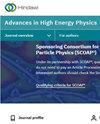Role of Time-Varying Magnetic Field on QGP Equation of State
IF 1.1
4区 物理与天体物理
Q3 PHYSICS, PARTICLES & FIELDS
引用次数: 0
Abstract
The phase diagram of quantum chromodynamics (QCD) and its associated thermodynamic properties of quark-gluon plasma (QGP) are studied in the presence of time-dependent magnetic field. The study plays a pivotal role in the field of cosmology, astrophysics, and heavy-ion collisions. In order to explore the structure of quark-gluon plasma to deal with the dynamics of quarks and gluons, we investigate the equation of state (EoS) not only in the environment of static magnetic field but also in the presence of time-varying magnetic fields. So, for determining the equation of state of QGP at nonzero magnetic fields, we revisited our earlier model where the effect of time-varying magnetic field was not taken into consideration. Using the phenomenological model, some appealing features are noticed depending upon the three different scales: effective mass of quark, temperature, and time-independent and time-dependent magnetic fields. Earlier the effective mass of quark was incorporated in our calculations, and in the current work, it is modified for static and time-varying magnetic fields. Thermodynamic observables including pressure, energy density, and entropy are calculated for a wide range of temperature- and time-dependent as well as time-independent magnetic fields. Finally, we claim that the EoS are highly affected in the presence of a magnetic field. Our results are notable compared to other approaches and found to be advantageous for the measurement of QGP equation of state. These crucial findings with and without time-varying magnetic field could have phenomenological implications in various sectors of high-energy physics.时变磁场对 QGP 状态方程的作用
研究了量子色动力学(QCD)相图及其在随时间变化的磁场作用下的夸克-胶子等离子体(QGP)的相关热力学性质。这项研究在宇宙学、天体物理学和重离子碰撞领域发挥着举足轻重的作用。为了探索夸克-胶子等离子体的结构以处理夸克和胶子的动力学,我们不仅研究了静态磁场环境下的状态方程(EoS),还研究了时变磁场环境下的状态方程(EoS)。因此,为了确定 QGP 在非零磁场下的状态方程,我们重新审视了之前未考虑时变磁场影响的模型。利用该现象学模型,我们注意到了三个不同尺度的一些吸引人的特征:夸克的有效质量、温度以及与时间无关和与时间有关的磁场。早些时候,我们在计算中纳入了夸克的有效质量,而在目前的工作中,我们针对静态磁场和时变磁场对其进行了修改。热力学观测值包括压力、能量密度和熵,这些观测值是针对与温度和时间相关以及与时间无关的各种磁场计算得出的。最后,我们声称,在磁场存在的情况下,EoS 会受到很大影响。与其他方法相比,我们的结果非常显著,并发现这对测量 QGP 状态方程非常有利。这些有无时变磁场的重要发现可能会对高能物理的各个领域产生现象学影响。
本文章由计算机程序翻译,如有差异,请以英文原文为准。
求助全文
约1分钟内获得全文
求助全文
来源期刊

Advances in High Energy Physics
PHYSICS, PARTICLES & FIELDS-
CiteScore
3.40
自引率
5.90%
发文量
55
审稿时长
6-12 weeks
期刊介绍:
Advances in High Energy Physics publishes the results of theoretical and experimental research on the nature of, and interaction between, energy and matter. Considering both original research and focussed review articles, the journal welcomes submissions from small research groups and large consortia alike.
 求助内容:
求助内容: 应助结果提醒方式:
应助结果提醒方式:


